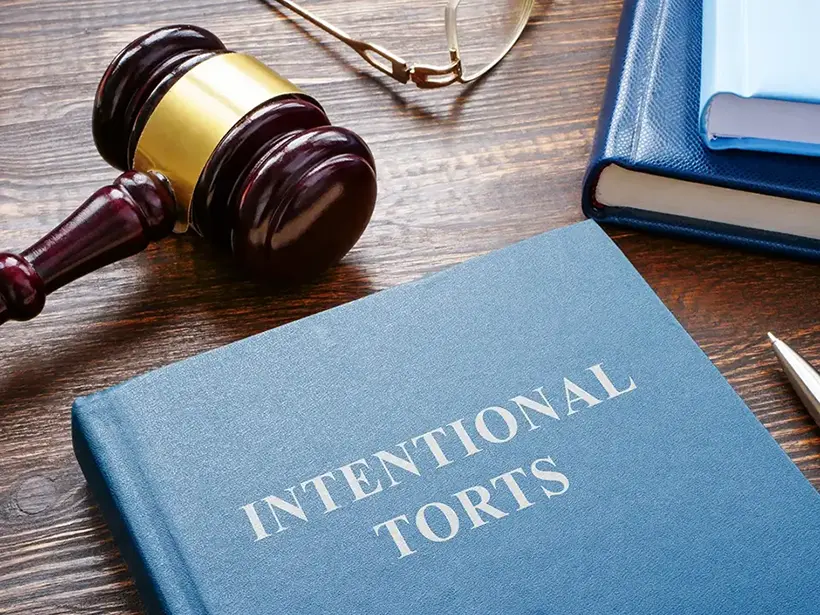When one party suffers injury due to the negligent actions of another, even when that negligence did not occur on purpose, the injured party has the right to seek compensation from the party that caused their injuries. However, in the case of intentional tort, the challenge can prove more severe. In cases of intentional tort, the liable party committed the negligent or damaging act deliberately. While they may not have sought to cause harm to someone else, they did engage in a deliberate act of negligence.
Definition of Intentional Tort
An intentional tort is an act of negligence that occurs deliberately rather than accidentally. When one party behaves negligently, the injured party does not need to show that there was a deliberate action on the part of the negligent individual in order to pursue compensation. However, showing that the liable party deliberately behaved in a dangerous or harmful way can help the injured party clearly establish intent. While intentional tort claims are not necessarily tied to criminal cases, many intentional torts are criminal actions. The victim of an act that causes physical or emotional damages may have the right to file a claim even in cases where the perpetrator does not face criminal consequences. The burden of proof is lower in civil cases than in criminal cases, which can make it easier for the victim to recover fair compensation for the damages they suffered.
Common Examples of Intentional Tort
Intentional tort incidents can occur whenever the liable party deliberately commits a potentially damaging or dangerous act. However, some cases are more common:
Road Rage
Drivers often engage in potentially negligent behavior behind the wheel without intent to cause harm. For example, a driver who chooses to speed may cause an accident unintentionally. On the other hand, a driver who engages in road rage often behaves in a deliberately malicious manner. The driver may ram into another vehicle or push the driver off the road with the intent to cause an accident.
Assault and Battery
Deliberately threatening or offensively hitting another person, including sexual assault, constitutes a deliberate act of harm against another party. The victim of assault or battery that causes significant injury or suffering has the right to file a civil claim, even in cases where the perpetrator is acquitted.
False Imprisonment
Deliberately imprisoning or trapping another party can cause not only significant physical harm, but also immense emotional distress. False imprisonment occurs when the liable party does not have the right to detain the other, and the imprisoned or trapped individual does not consent.
Deliberate Infliction of Emotional Distress
While many examples of intentional torts are physical, the purposeful administration of emotional distress can also count. Racial or sexual insults or false imprisonment, for example, can inflict substantial emotional distress. Behavior that creates significant fear of physical harm, even when physical harm is ultimately not present, can also cause immense emotional challenges for many victims.
Pursuing Compensation in Intentional Tort Cases
When an injured party suffers damages due to the aggressive or negligent actions of another, they can file a claim to seek compensation for those damages. Claims in intentional tort cases can include compensation for:
Medical costs due to the negligent acts of the liable party. Medical bills may include not only immediate medical treatment related to the injury, but also long-term treatment costs like physical and occupational therapy or the need for in-home care while recovering.
Income losses when the injured party misses work because of the injury.
Lost earning potential, if the injured party permanently loses the ability to work, or to work in their chosen field, after the incident.
Property damage. Many damaging incidents can cause damage to the injured individual’s property as well as to the injured individual directly.
Pain and suffering, including emotional distress related to the incident.
A lawyer can help the injured party take a closer look at all related damages so that they can put together a comprehensive claim that includes all the challenges faced because of the incident.
The Difference Between Intentional Tort Claims and Criminal Cases
Many of the claims involving intentional tort cases are also criminal actions. When an injured party suffers damages because of criminal actions, they have the right to pursue compensation for those losses, including the emotional suffering and distress caused by the incident. A criminal conviction can make it easier to pursue compensation through a civil claim. For example, suppose a driver is criminally convicted of road rage. In that case, the individuals injured in a car accident caused by the driver’s aggressive behavior may have clear proof of the cause of the accident. However, a criminal case places the burden of proof on the accuser. The prosecutor must show beyond reasonable doubt that the liable party did commit those actions.
In a civil claim, on the other hand, the burden of proof is much lower. While the injured party’s attorney will still need to establish that the liable party caused those injuries, it is usually enough to reasonably show the connection between the liable party’s negligence or actions and the damages sustained by the victim. Even if the criminal case is closed without a conviction, victims can still win compensation through a civil claim.
While a criminal conviction can serve as evidence in a civil trial, the criminal case does not grant compensation to the victim. In order to recover compensation for the damages related to the accident, the injured party will need to file a personal injury claim.
Bring Intentional Tort Questions to Your Lawyer
Having an attorney allows intentional tort claims to proceed smoothly. A lawyer can not only collect evidence and put it together in a way that clearly shows the liable party’s actions and their connection to the victim’s injuries, but they can also assist the injured party in compiling a clear list of all damages sustained due to the accident.





